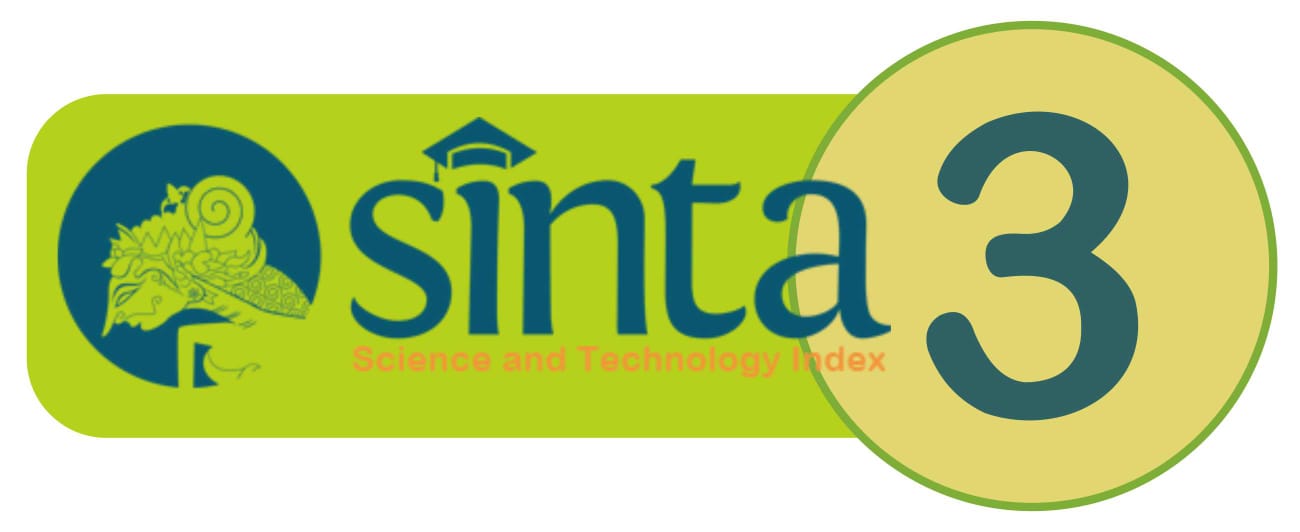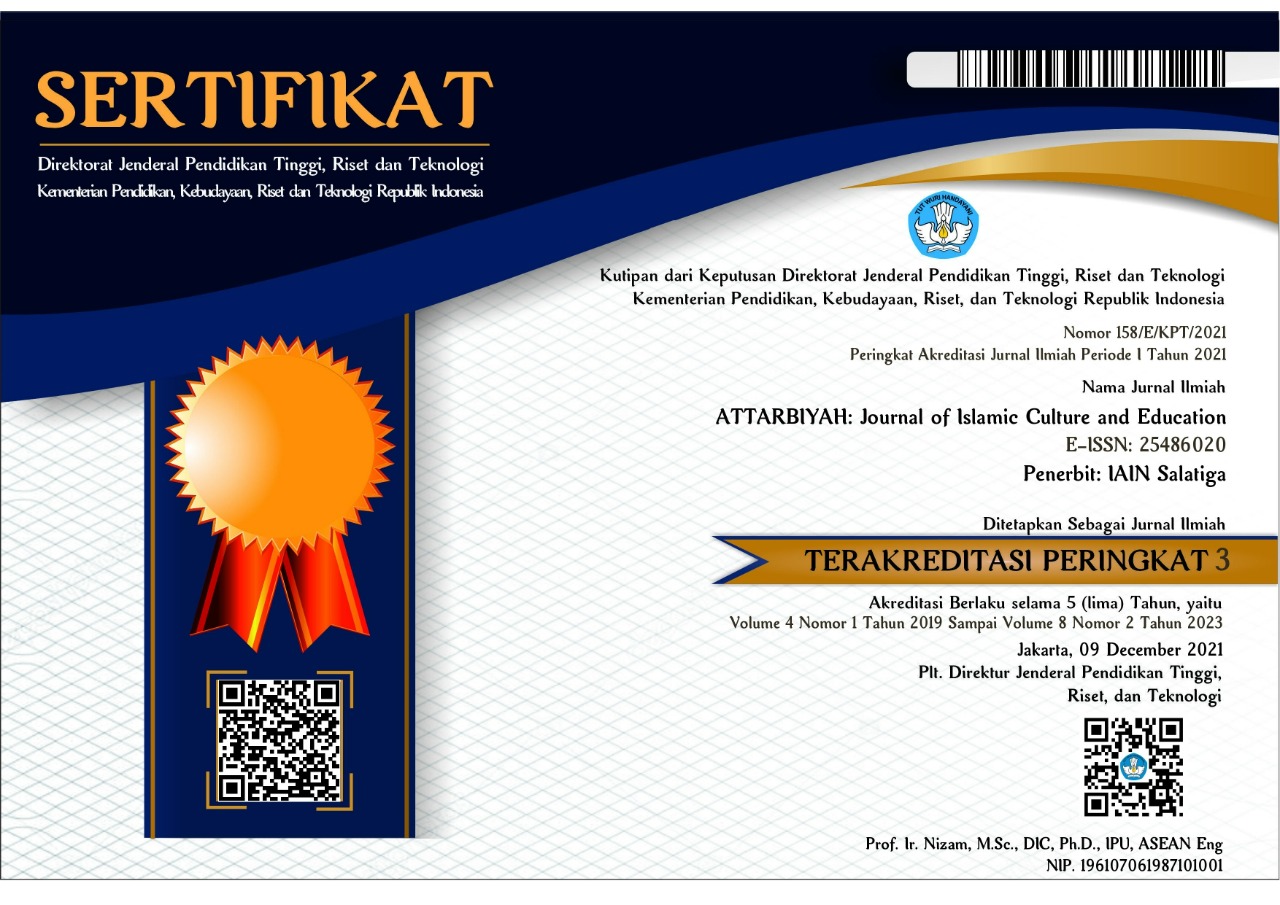The development of affective assessment instruments in the new normal era (post-covid-19)
Abstract
This development research was conducted at MTs Ma'arif Ketegan Sidoarjo. The types of data obtained are qualitative and quantitative data. The survey results showed that 50% of teachers developed their own affective assessment instruments but 87.5% of teachers admitted that these instruments were not valid and reliable. Then as many as 81.3% of teachers chose to use the observation method in assessing student effectiveness during online learning, because it is considered the easiest. As many as 62.5% of teachers do not understand that affective assessment of students in online learning can be done using the self-assessment method. The instrument is presented in a Google Form which contains 50 contextual statement points with a Likert Scale. The content validation score with the Aiken's V formula obtained a score of less than 1 for each statement item. Construct validation is a follow-up to the input of the supervisor and the theory that has been analyzed. External validation shows an increase in instrument models that are more applicable and adaptive. Instrument stability obtained a score of 0.885 so it was concluded that it was less reliable for a significant level of 1% and reliable for a significant level of 5%. The instrument equivalence data shows that there is no significant change in the results of the original and alternative instruments. Internal consistency with the Cronbach Alpha coefficient obtained a score of 0.92 with a very high category. The instrument also has a practical and efficient title. Thus this instrument is considered valid, reliable, useful, and valid. The response given by this instrument is said to be valid, reliable, practical and valid.
Keywords
Full Text:
PDFReferences
Anderson, L. W., & Bourke, S. F. (2013). Assessing affective characteristics in the schools, second edition. Assessing Affective Characteristics in the Schools, Second Edition. doi:10.4324/9781410605443
Bakker, A. (2018). Design Research in Education: A Practical Guide for Early Career Researchers. New York: Routledge.
Boellstorff, T., Nardi, B., Pearce, C., & Taylor, T. L. (2012). Ethnography and Virtual Worlds: A Handbook of Method. New Jersey: Princenton University Press.
Cohen, L., Manion, L., & Morrison, K. (2000). Research Methods in Education (5th ed.). London: Routledge Falmer.
Dunn, L., Morgan, C., O’Reilly, M., & Parry, S. (2004). The Student Assessment Handbook. The Student Assessment Handbook. London: Routledge Falmer. doi:10.4324/9780203416518
Gall, M. D., Gall, J. P., & Borg, W. R. (2002). Educational Research: An Introduction. (A. E. Burvikovs, Ed.) (7th ed.). Boston: Library of Congress Cataloging-in-Publication Data.
Gibbs, G., & Simpson, C. (2003). Measuring The Response of Students to Assessment: The Assessment Experience Questionnaire. Milton Keynes. Retrieved from docplayer.net/12543680-Measuring-the-response-of-students-to-assessment-the-assessment-experience-questionnaire.html
Hall, R. A. (2011). Affective Assessment: The Missing Piece of The Educational Reform Puzzle. International Journal for Professional Education, 77–2(1), 7–10. Retrieved from http://www.deltakappagamma.org/NH/dkgbulletinwinter2011.PDF
Hetland, P., & Mørch, A. I. (2016). Ethnography for Investigating the Internet. Seminar.Net, 12(1), 1–14.
Imania, K. A. N., & Bariah, S. K. (2019). Rancangan Pengembangan Instrumen Penilaian Pembelajaran Berbasis Daring. PETIK, 5(1), 31–46. Retrieved from https://journal.institutpendidikan.ac.id/index.php/petik/article/viewFile/445/452
Imtihan, N., & Ahyar. (2018). Analysis of Problem and Need on The Affective Assessment Implementation for Learners in Madrasah Aliyah. In Internasinonal Seminar on Education and Development of Asia (pp. 102–112). Mataram. Retrieved from https://core.ac.uk/reader/234035660
Korucu, A. T., & Atun, H. (2016). Use of Social Media in Online Learning. In Handbook of Research on Innovative Pedagogies and Technologies for Online Learning in Higher Education (pp. 1–547). USA: IGI Global. doi:https://doi.org/10.4018/978-1-5225-1851-8
Kozinets, R. V. (2010). Netnography: Doing Ethnographic Research Online. International Journal of Advertising (Vol. 29). London: SAGE. doi:10.2501/S026504871020118X
McCoach, D. B., Gable, R. K., Madura, J. P., McCoach, D. B., Gable, R. K., & Madura, J. P. (2013). Defining, Measuring, and Scaling Affective Constructs. Instrument Development in the Affective Domain. London: Springer. doi:10.1007/978-1-4614-7135-6_2
Mendikbud RI. (2010). Pengembangan Pendidikan Budaya dan Karakter Bangsa. Jakarta: Badan Penelitian dan Pengembangan Pusat Kurikulum. Retrieved from http://new-indonesia.org/beranda/images/upload/dok/kurikulum/pengembangan-pendidikan-budaya-dan-karakter-bangsa.pdf
Mendikbud RI. (2016). Peraturan Menteri Pendidikan dan Kebudayaan Republik Indonesia Nomor 23 Tahun 2016. Jakarta. Retrieved from https://bsnp-indonesia.org/wp-content/uploads/2009/09/Permendikbud_Tahun2016_Nomor023.pdf
Mendikbud RI. (2017). Penguatan Pendidikan Karakter Jadi Pintu Masuk Pembenahan Pendidikan Nasional. Retrieved 21 November 2020, from https://www.kemdikbud.go.id/main/blog/2017/07/penguatan-pendidikan-karakter-jadi-pintu-masuk-pembenahan-pendidikan-nasional
National Advisory Board on Research Ethics. (2009). Ethical Principles of Research in The Humanities and Social and Behavioural Sciences and Proposals for Ethical Review (Vol. 2009). Helsinki. Retrieved from https://www.tenk.fi/sites/tenk.fi/files/ethicalprinciples.pdf
Näykki, P., Laru, J., Vuopala, E., Siklander, P., & Järvelä, S. (2019). Affective Learning in Digital Education—Case Studies of Social Networking Systems, Games for Learning, and Digital Fabrication. Frontiers in Education, 4(November), 1–14. doi:10.3389/feduc.2019.00128
Phan, W. T. (2019). Affective Learning Objectives in Online Course. In ICEMT 2019: Proceedings of the 2019 3rd International Conference on Education and Multimedia Technology (pp. 33–36). Nagoya - Japan: Association for Computing Machinery, New York, NY, United States. doi://doi.org/10.1145/3345120.3345189
Ratumanan, T. G., & Rosmiati, I. (2019). Perencanaan Pembelajaran (1st ed.). Depok: Rajawali Pers.
Ridlo, A. (2021). Wawancara. Sidoarjo.
Riscaputantri, A., & Wening, S. (2018). Pengembangan instrumen penilaian afektif siswa kelas IV sekolah dasar di Kabupaten Klaten. Jurnal Penelitian Dan Evaluasi Pendidikan, 22(2), 231–242. doi:10.21831/pep.v22i2.16885
Setiawan, H., & Tumardi, T. (2019). Pengembangan Instrumen Asesmen Kompetensi pada Ranah Afektif di Sekolah Dasar. Musamus Journal of Primary Education, 2(1), 1–12. doi:10.35724/musjpe.v2i1.1944
Sivasailam, T., Semmel, D. S., & Semmel, M. I. (1974). Instructional development for training teachers of exceptional children: A sourcebook. ERIC. Indiana: Indiana University Bloomington.
Sugiyono. (2017). Statistika Untuk Penelitian. Bandung: Alfabeta.
Szurawitzki, M. (2012). Analyzing the Language of Social Networking Sites - An Analysis Model. Proceedings of the 24th Scandinavian Conference of Linguistics, (December 2012), 355–363.
Tessmer, M. (1993). Planning and Conducting Formative Evaluations. London: Kogan Page.
Velea, S., & Farca, S. (2013). Teacher’s Responsibility in Moral and Affective Education of Children. Procedia - Social and Behavioral Sciences, 76, 863–867. doi:10.1016/j.sbspro.2013.04.221
Wong, S. L. (2020). Affective characteristics for 21st century learning environments: Do they matter? International Journal of Interactive Mobile Technologies, 14(12), 186–194. doi:10.3991/IJIM.V14I12.15567
Yadegaridehkordi, E., Noor, N. F. B. M., Ayub, M. N. Bin, Affal, H. B., & Hussin, N. B. (2019). Affective computing in education: A systematic review and future research. Computers and Education, 142(March), 1–19. doi:10.1016/j.compedu.2019.103649
Yee, N., & Bailenson, J. (2007). The Proteus Effect: The Effect of Transformed Self-Representation on Behavior. Human Communication Research, 33(3), 71–90. doi:https://doi.org/10.1111/j.1468-2958.2007.00299.x
DOI: https://doi.org/10.18326/attarbiyah.v7i2.191-206
Refbacks
- There are currently no refbacks.

ATTARBIYAH: Journal of Islamic Culture and Education by http://attarbiyah.iainsalatiga.ac.id/ is licensed under a Creative Commons Attribution-ShareAlike 4.0 International License
----------------------------------------------------------
ATTARBIYAH : Journal of Islamic Culture and Education IAIN SALATIGA p-ISSN: 0215-9996, e-ISSN: 2548-6020



